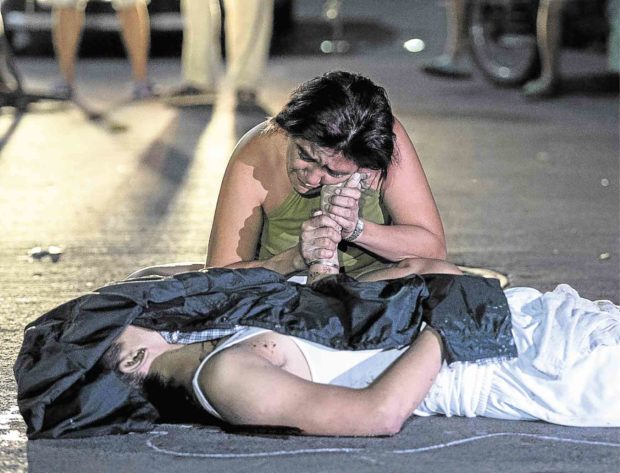More people believe drug addiction thrives – SWS survey

Street executions of drug suspects, like Aldrin Castillo shown here lying lifeless on a Manila street with his grieving mother in October last year, have generated an outcry against the bloodshed that went with the government’s war on drugs. A survey in December showed the antidrug campaign has changed little in people’s perception that drugs continued to thrive. —AFP
The number of Filipinos who believed that drug addiction thrives in their neighborhoods had increased, according to results of a recent Social Weather Stations (SWS) survey.
Results of the survey conducted last December, came as the government relaunched a controversial police antidrug operation plan that was being blamed for thousands of deaths of drug suspects in street executions and police raids.
The survey results also showed fears about unsafe streets and burglaries lingered.
According to results of the Dec. 8-16, 2017 survey by SWS, 42 percent of respondents said they agreed that “many people addicted to banned drugs” are in their neighborhoods. The number was up from 37 percent in September last year.
Home security
Article continues after this advertisementAlso 59 percent of respondents agreed that in their neighborhoods, “people are usually afraid” of falling victims to robberies in their homes. The number was up from 54 percent in September.
Article continues after this advertisementNearly half (48 percent) agreed with the statement “In this neighborhood, people are usually afraid to walk in the street at night because it is not safe.” The percentage was barely changed from September.
Compared with 2016 figures, however, the number of Filipinos fearing crimes had gone down in 2017, according to the survey results.
The 2017 average was 57 percent for fear of burglary (from 60.3 percent in 2016), 49.8 percent for fear of unsafe streets (from 50.5 percent in 2016) and 44.8 percent for fear of drug addicts (from 56.3 percent in 2016).
More secure
Between September and December, the number of Filipino adults nationwide claiming that they felt more secure now was higher although the number of those who said they fell victims to crimes increased slightly.
The number of families reporting they had fallen victims of crimes in the past six months—either losing valuables or being physically hurt—was 7.6 percent, or roughly 1.7 million, up from 6.1 percent or 1.4 million in September.
The survey used face-to-face interviews with 1,200 respondents. It had a margin of error of plus-or-minus 2.5 percentage points for national percentages and plus-or-minus 6 percentage points for area percentages.
The December rate of people who had fallen victims to crimes was highest since June 2016 when it was 11.4 percent. The rate for the rest of 2017’s fourth quarter, however, brought the common crime victim rate to a record low 6.1 percent. The month with the lowest victim rate was June with 3.7 percent.
Street crimes
The percentage of those who said they fell victim to property crimes, whether street robbery, break-ins or car theft, increased from 5.8 percent (1.3 million families) in September to 7.1 percent (1.6 million) in December, highest since the 10.9 percent seen in June 2016.
The survey further found 4.6 percent, or about a million families, saying they had fallen victims to pickpockets in the last quarter of 2017 from 4.4 percent, or also about a million families, in September. At least 790,000 families, or 3.4 percent, had been victims of break-ins at their homes in December, up from 2.4 percent, or 524,000 families, in September.
Those who fell victims to car theft was 1.2 percent in December, up from 0.2 percent in September.
At least 188,000 families or 0.8 percent were victims of physical violence, slightly more than the 115,000 families or 0.5 percent in September. —Ana Roa